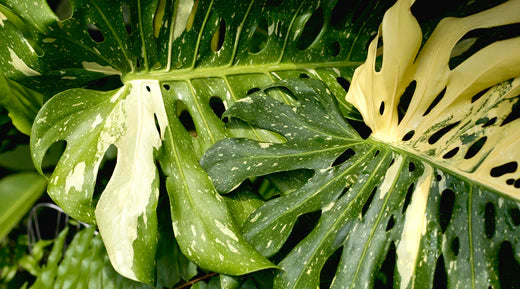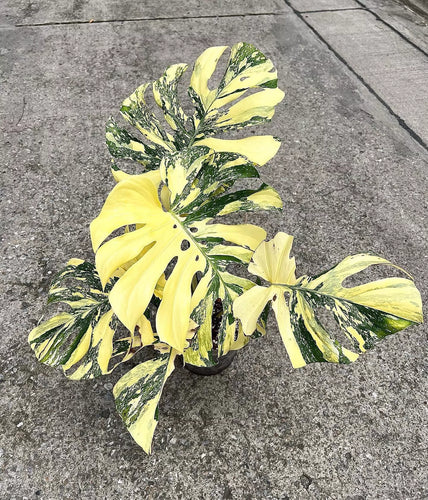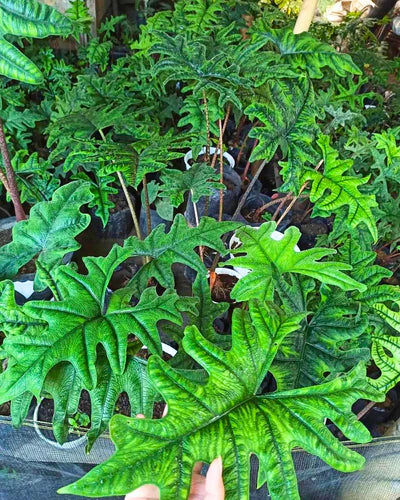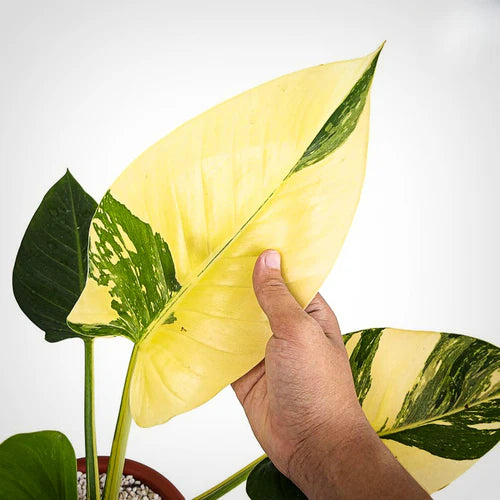Can Monstera Thai Constellation Revert?

Can Monstera Thai Constellation Revert?
Ah, the Monstera Thai Constellation - a plant that is known for its striking variegation of creamy whites and dark greens on its leaves. This tropical houseplant has become a favorite among horticultural enthusiasts. But as with any variegated plant, the question always arises - will it revert back to its original green form? Fear not my plant friends, for I am here to explain why the Monstera Thai Constellation's variegation won't revert back to just green leaves.
Monstera Thai Constellation basics:
First, let's start with the basics of plant foliage. Variegation occurs when there is a mutation in the plant's DNA, causing certain cells to lack chlorophyll. Chlorophyll is what gives plants their green color and is responsible for photosynthesis, which is essential for the plant to grow big and healthy. In variegated plants, the areas without chlorophyll appear as a 'variegation' of white, cream, pink, light green or yellow on the leaves.
How Variegation Works In Plants:
Now, it's important to note that not all variegation is created equal. Some variegation is stable, meaning it will remain consistent throughout the plant's life, while others are unstable and may revert back to their original form. In the case of the Monstera Thai Constellation, the variegation is stable. Here are a few reasons why that's the case.
Firstly, the variegation in the Monstera Thai Constellation is a result of a genetic mutation that affects the plant's meristem cells. Meristem cells are responsible for the growth and development of the plant, and the mutation causes the cells to produce less chlorophyll in certain areas. Because this mutation occurs in the meristem cells, it is passed down to all new growth on the plant. This means that any new leaves that emerge will also display the same type of variegation.
Secondly, the Monstera Thai Constellation is a tissue-cultured plant. Tissue culture is a method of propagation where a small piece of the plant is taken from the 'mother plant' and grown in a sterile laboratory environment. This is done to produce large quantities of plants quickly and efficiently. Tissue-cultured plants are genetically identical to the parent plant, meaning that the variegation in the Monstera Thai Constellation is consistent throughout all propagated plants.
Finally, the Monstera Thai Constellation is a slower-growing plant. Variegation is more likely to revert back to green in fast-growing plants because they produce more chlorophyll to sustain their rapid growth. However, since the Monstera Thai Constellation grows at a slower pace than the all green Monstera Deliciosa, it has a better chance of maintaining its variegation.
Monstera Thai Constellation Variegation:
So, there you have it - the Monstera Thai Constellation's variegation is stable and won't revert back to just all green leaves. But, as with any plant, there are a few things to keep in mind to ensure that your Monstera Thai Constellation remains healthy, happy and variegated.
Monstera Thai Con Care:
To make sure your Thai Con is happy, you need to be giving it enough light. Variegated plants require more light than their green counterparts because they have less chlorophyll to absorb sunlight. However on the flip-side, direct sunlight can scorch the leaves, so it's important to find a good balance. A bright, indirect light is ideal for the Monstera Thai Constellation's variegation.
Secondly, make sure that you're not overwatering your Thai Con. Variegated plants have a lower chlorophyll content, which means they have a slower rate of photosynthesis. This in turn, means that they don't require as much water as green plants. Overwatering can lead to root rot, which Monstera Thai's are known for and can be fatal for your beloved plant.
Finally, make sure that you're fertilizing your plant regularly with half diluted solutions. Variegated plants require more nutrients than green plants because they have less chlorophyll. In addition, be sure to research your Thai Constellations care needs in detail before making a plant purchase.




